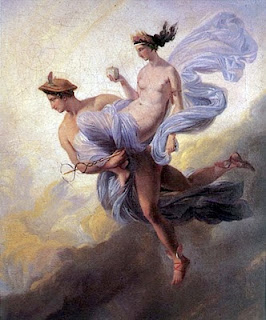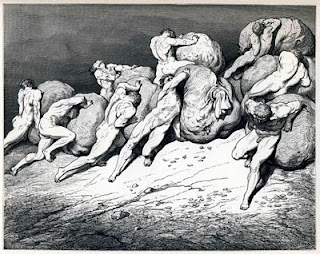The fates of those condemned to punishment are often revealing windows into the psyche of another culture. Through a dramatic example, they show us at once what qualities are deplored and which are admired. It bears little wonder therefore, why criminals gain such infamy in the popular mindset. Particularly where sympathy may stain a reputation of atrocity. The men and women condemned to the depths of Tartarus in Roman and Greek lore are no different, and their stories no less remembered for it (for a story of another such man, please click here). One such man was Ixion, whose tale merges ignominy and tragedy in equal measure.
Ixion, like the hero Bellerophon (for more about him, please click here), was of a cursed line. His father, whose name was Phlegyas, was also tormented in the Underworld, as was his sister, Coronis. One day the god Apollo, enamoured of Coronis, had ordered a white raven to guard her when his divine presence was required elsewhere. She was pregnant with the Sun god's own son, and was not to be touched by another. With Apollo's absence however, Coronis soon became infatuated with a local Lapith chieftain, a man named Ischys. The day came when Apollo returned, and the god asked the white raven if Coronis had been kept safe in his absence. The bird, fearful of its master, told him of the affair it had witnessed. Filled with fury that the raven had not pecked out the eyes of Ischys for daring to even look upon Coronis, Apollo unleashed a curse upon the bird so powerful the feathers on its body were badly scorched. Ever since this time, the plumage borne by all ravens has been black, a living reminder of their progenitor's fate. Appalled, the god of the sun pierced her with an arrow, slaying her instantly. The soul of the girl was borne to Tartarus, where it was ever after punished, yet upon her funeral pyre, her unborn son was saved by Apollo, overcome as he was by remorse. Her son was named Asclepius, and would become the god of medicine and healing, patron god of doctors. Phlegyas however, was driven mad with anger at the killing of his daughter. In retaliation, Phlegyas torched the sacred temple of Apollo at Delphi itself, committing the ultimate act of blasphemy, such that his name came to mean 'the fiery one' in the Greek tongue. Inevitably, Apollo struck the man down.
Such was the legacy left to Ixion, who had seen both his own father and sister slain by a god. Thirsting for vengeance, Ixion would ever after pit himself against Olympus, even the father of gods himself. One day, Ixion, like his sister, fell foul of dangerous passion. Wishing to be wed to the maiden Dia, daughter of Deioneus, but unable to afford the steep bride price (the opposite of the dowry) required, Ixion despaired. Driven to desperation, Ixion turned to deceit. Telling Deioneus that he would present a valuable gift to him in return for Dia, the two were wed, and soon ran away. In revenge, Deioneus seized Ixion's horses as compensation for the crime. Angered in turn, Ixion tried his hand at deception once more. Inviting Deioneus to a great feast, ostensibly to settle matters rationally, Ixion prepared his trap. Deioneus arrived and moved to embrace his son-in-law, but reconciliation was far from the mind of Ixion. Approaching slowly, Ixion suddenly and violently pushed Deioneus into the fire, and so 'he was the hero who, not without guile, was the first to stain mortal men with kindred blood'. The relationship between guest and host was a holy one in ancient times. A host was supposed to treat a guest with charity, respect and kindness, and a guest should honour his host suitably. It was a bond so sacred that it's patron was the Thunderer himself. Yet Ixion had not only disrespected his guest, he had murdered him, polluting himself with the most savage of crimes.
Slowly falling into insanity, Ixion wandered the plains, spurned by all men, so horrified were they at his crime. Seeing the outlaw living so wretchedly, and recalling the tragedy of Ixion's family, Zeus offered the hand of redemption to this polluted man. The king of the gods even brought him to the banqueting table on Olympus itself, inviting Ixion to dine with the gods. However, at his moment of forgiveness, Ixion did not forget, nor forgive. Just as the gods had treated his father and sister so lamentably, Ixion resolved to punish even Zeus himself. Just as Apollo had made sport of Coronis, now Ixion turned his attention upon Hera, queen of the gods and the wife of Zeus. Plotting in his mind, Ixion resolved to abduct the goddess, once again violating the bond of guest to host, this time violating it in the name of its very patron. Zeus however, was omniscient. Seeing the dark thoughts brewing in his mind, Zeus could not believe that Ixion would dare do such a thing, but prepared a test nonetheless. Crafting an image of his wife from the clouds, Zeus created the cloud woman, Nephele, who resembled Hera perfectly. To Zeus' dismay, Ixion seized Nephele and stole away to his quarters on Olympus. Ixion even begot a son by Nephele, named Centaurus, a man so deranged he would one day take one of the mares which lived on Mount Pelion as his wife, and thus sire the race of Centaurs, creatures who would ever after cause great strife in the kingdoms of men.
The Thunder god was stricken with fury. Not content with violating the bonds between men, Ixion had violated the bonds between the gods themselves. Zeus hurled a thunderbolt at Ixion, blasting him from the summit of Mount Olympus. Furthermore, Zeus ordered Hermes to bind Ixion to a wheel made of fire, a wheel decreed to spin across through the skies for eternity, as Ixion looked on alone at the world he had polluted, victim of the terrible agony of his fiery bonds...
United Kingdom
The Odes of Pindar
The Complete Odes (Oxford World's Classics)
(The story of Ixion and his punishment in poetry)
The Library of Greek Mythology
The Library of Greek Mythology (Oxford World's Classics)
(A less poetic account, but includes a wealth of information from across Greek Mythology)
United States
The Odes of Pindar
The Complete Odes (Oxford World's Classics)
(The story of Ixion and his punishment in poetry)
The Library of Greek Mythology
The Library of Greek Mythology (Oxford World's Classics)
(A less poetic account, but includes a wealth of information from across Greek Mythology)
 |
| The Anguish of Ixion Painting by Jules-Élie Delaunay. |
 |
| Mount Olympus Photograph taken by Aline Zienowicz. |
 |
| Ixion is bound to the Wheel of Fire Engraving by Bernard Picart. |
The Thunder god was stricken with fury. Not content with violating the bonds between men, Ixion had violated the bonds between the gods themselves. Zeus hurled a thunderbolt at Ixion, blasting him from the summit of Mount Olympus. Furthermore, Zeus ordered Hermes to bind Ixion to a wheel made of fire, a wheel decreed to spin across through the skies for eternity, as Ixion looked on alone at the world he had polluted, victim of the terrible agony of his fiery bonds...
United Kingdom
The Odes of Pindar
The Complete Odes (Oxford World's Classics)
(The story of Ixion and his punishment in poetry)
The Library of Greek Mythology
The Library of Greek Mythology (Oxford World's Classics)
(A less poetic account, but includes a wealth of information from across Greek Mythology)
United States
The Odes of Pindar
The Complete Odes (Oxford World's Classics)
(The story of Ixion and his punishment in poetry)
The Library of Greek Mythology
The Library of Greek Mythology (Oxford World's Classics)
(A less poetic account, but includes a wealth of information from across Greek Mythology)



















